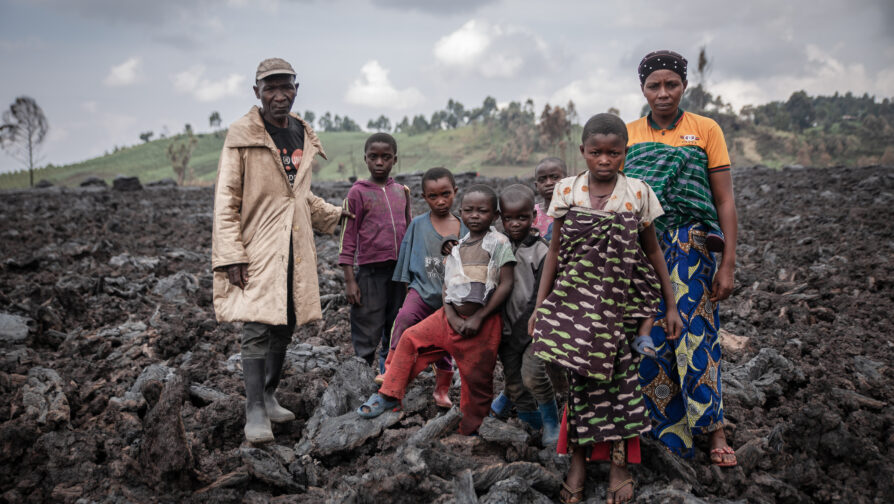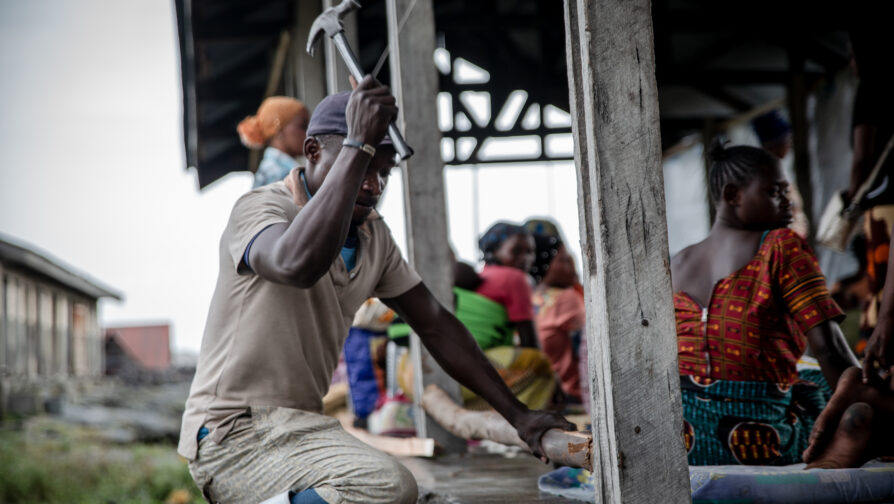As natural disasters exacerbate forced displacement, emergency support from Denmark allows UNHCR to provide shelter to vulnerable people in DR Congo.
Esperance Muhoza stands where her family home once stood. © UNHCR/Guerchom Ndebo
Esperance and her husband Jean used to live in a house with their seven children in Kibati, a neighbourhood next to Goma in eastern Democratic Republic of the Congo. In May 2021, they witnessed as lava poured down Mount Nyiragongo volcano and reached the land that held their home and provided them with a living.
“I saw it pour down the mountain. We fled to the next hill for safety. Everything was destroyed in front of us – our house, the land we used to cultivate. We lost our home and income,” Jean says.

Jean and Esperance stand with their children on volcanic rock that now covers their former home. © UNHCR/Guerchom Ndebo
More than 364,000 people like Esperance and Jean fled Goma and its surrounding areas in the days following the eruption. Before being displaced themselves, they were part of the communities helping and hosting people displaced by conflict in the country’s North Kivu region.
As the volcano erupted, UNHCR, the UN Refugee Agency, was already in the area helping those who had been forced to flee violence – and the agency was therefore able to move swiftly to respond to the needs of the displaced and start distributing emergency supplies, soap, hygiene kits, and plastic sheeting.
Nearly 20,000 Congolese lost their homes as a result of the eruption. The chances of return are severely hampered, due to a lack of financial resources to either pay rent or generate new income. Many are finding themselves on the outskirts of larger cities, on the fringes of society, and vulnerable to the serious human rights violations that flank the violent skirmishes in the region.
Many people have been taken in by host families. As is seen so often in DR Congo, whether due to conflict or natural hazards, people are generously helping the displaced and sharing what little they have.
A recent contribution of USD 2.2 million from Denmark’s Emergency Reserve Fund helps UNHCR respond to the pressing needs of families and people like Jean and Esperance who lost both their homes and livelihoods. They can receive sleeping mats, blankets, tarps, cash for food, jerrycans and soap. The Danish contribution also reinforces UNHCR’s efforts to build communal shelters in several locations.
Furthermore, working closely with the local government, efforts are being made to identify land in Nyiragongo territory to build more homes, with construction tools also being distributed, empowering the displaced to build shelters for themselves with as many as 600 families standing to benefit from this initiative.
“Denmark’s financial support to UNHCR’s DR Congo operation has been vital for our ability to respond to the urgent needs of those families who lost both homes and livelihoods from the sudden eruption of Mount Nyiragongo. We have been able to provide emergency shelter and humanitarian assistance so the families can be supported to make it through this traumatic period and gradually rebuild their lives,” said Henrik M. Nordentoft, UNHCR’s Representative to the Nordic and Baltic Countries.
With support from countries like Denmark, the agency has been able to respond quickly when the needs are most pressing. In addition, the Danish emergency support helps UNHCR implement more protection measures by training partners to prevent sexual abuse and providing psychosocial support for survivors of gender-based violence.

Following the eruption of Mount Niyiragongo, UNHCR immediately began providing communal shelters as well as tarps and emergency supplies. © UNHCR/Guerchom Ndebo
Within its overall funding, Denmark annually contributes with an Emergency Reserve Fund of DKK 50 million (around USD 7.4 million) at the start of each year, which UNHCR can allocate towards the most urgent needs. The flexibility of the fund allows UNHCR to respond to emergencies, which saves lives and assists displaced people with critical protection needs and acute basic necessities. In 2021, USD 2.2 million from the emergency reserve went to UNHCR’s operation in the Democratic Republic of Congo. Other allocations went to UNHCR’s work in the Sahel region and in The Central African Republic.
In 2021, Denmark provided UNHCR with over USD 100 million, of which a significant part is provided as flexible funding, allowing UNHCR to prioritize its response and support protracted, forgotten, and underfunded situations. Denmark is one of UNHCR’s most important financial donors.
Share on Facebook Share on Twitter